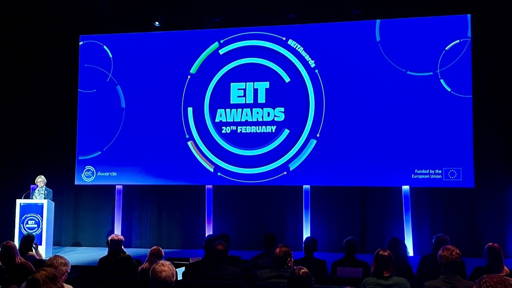Each year at CES – the world’s leading consumer electronics show in Las Vegas – innovations shaping the future make their debut. Highlights of the 2025 edition include NVIDIA’s mini-supercomputer, boasting computing power 1,000 times greater than a laptop, alongside heartwarming gadgets like the Mirumi robot. Here are our top picks.
Good mood with Mirumi
It’s a thought-provoking paradox: at CES, cutting-edge humanoids did not attract as much attention as Mirumi, a small, plush robot whose primary purpose is… to entertain people. Clipped onto a bag or backpack, Mirumi observes the world around it. Thanks to built-in sensors, it hides its face when approached. And that’s the extent of Mirumi’s functionality.
According to its developer, Yukai Engineering, the robot is designed to elicit positive emotions, amuse people, and spark human interactions. Mirumi charmed the audience with its shyness and plush-like appearance. Developed through crowdfunding campaign, the robot is expected to become available soon at a price of around $70.

Photo" Yukai Engineering
AI-powered mirror Omnia by Withings
Withings, the French company known for health-monitoring devices, already offers a range of products such as smartwatches, smart mattresses, and smart blood pressure monitors. At CES 2023, it presented U-Scan, a home urine lab, and at CES 2024, BeamO, a 4-in-1 health monitoring device.
This year, Withings continues to innovate with Omnia, a smart mirror capable of performing full-body scans and analyzing body composition. The mirror integrates data from other Withings devices, analyzes it, and provides health tips to users. It can also facilitate telemedicine consultations. Equipped with AI powered by large language models like ChatGPT, Omnia allows users to ask questions about their health. Currently, it is a concept product, and it’s unclear if it will be ever developed.

Photo: Withings
Less salt in food with the Kirin electric spoon
According to the European Commission data, salt consumption among adults in most European countries ranges from 7 to 13 g per day, while the World Health Organization (WHO) 5 g per day. Excess sodium in the diet can have severe health consequences, leading to high blood pressure, strokes, heart failure, heart attacks, and stomach cancer.
But what can you do when under-salted food tastes bland and spoils the pleasure of eating? Japanese engineers have found a solution: the Kirin electric spoon. By sending mild electric currents to the tongue, the e-spoon stimulates taste receptors, making low-sodium food taste properly salted. This innovation is already available in Japan. We now await a similar device that can trick taste buds responsible for detecting sweetness.

Photo: Kirin
Circular Ring 2: upgraded health tracking in jewelry
Not long ago, getting an ECG required a visit to the doctor. Later came special pads attached to smartphone, followed by smartwatches. Now, the functionality has made its way into jewelry. Circular Ring 2 is the world’s first ring capable of performing ECGs, setting it apart from competitors like the Oura Ring or Samsung Galaxy Ring. This capability allows it to detect atrial fibrillation (AFib).
According to the manufacturer, the feature has been approved by the U.S. Food and Drug Administration (FDA). Naturally, the ring also measures other health parameters such as blood oxygen saturation, body temperature, pulse, Vo2 max, sleep cycles, heart rate variability, energy levels, and stress. When it’s time to wake up, the built-in alarm gently vibrates on the wearer’s finger. The accompanying Kira app includes an AI assistant that explains the measurement results. Price: $380.

Photo: Circular
Restful sleep with Ozlo Sleepbuds
Earbuds that double as earplugs. Soft enough for side-sleeping without pressure or discomfort, and snug enough to stay put through the night. Ozlo Sleepbuds can play ambient sounds that block out environmental noise for up to 10 hours without needing a Bluetooth connection to a smartphone. When biometric sensors detect sleep onset, playback stops automatically.
But there’s more: the case is equipped with additional sensors for light, noise, and temperature to monitor environmental factors that could negatively affect sleep quality. An in-ear alarm won’t wake up the person next to you. The manufacturer claims the noise-canceling feature is so effective it can block even loud snoring. Price: €349.

Photo: Ozlo
Accelerating research with NVIDIA’s Project Digits
NVIDIA, a leader in computer chip manufacturing, introduced Digits, a personal AI supercomputer with 1000 times the computing power of a laptop. Small enough to fit in your hand, it allows users to harness the full capabilities of AI with 200 billion parameters.
Priced at only $3,000, NVIDIA’s CEO Jensen Huang predicts that Digits will enable groundbreaking AI innovations across industries. This supercomputer could play a pivotal role in medical and pharmaceutical research – offering, for the first time, a system this powerful at such a low cost. Research requiring significant computational power, such as drug development, is now more accessible to a wider range of research institutions.

Photo: NVIDIA
Improved skin care with L’Oréal’s Cell BioPrint
L’Oréal has introduced a device for at-home skin analysis and personalized skincare recommendations. Using proteomics technology, the system calculates the biological age of the skin, identifies biomarkers accelerating aging, and predicts potential cosmetic issues. The analysis, conducted using a specialized sensor, takes just five minutes. Afterward, users receive tailored recommendations on how to slow the aging process, enhance skincare efficiency, and prevent problems such as discoloration and enlarged pores.
According to L’Oréal, Cell BioPrint leverages more than 100 NanoEnTek patents for rapid, non-invasive skin health analysis. The pilot program is planned for late 2025, initially in Asia.

Photo: L'Oreal
Support for nurses with Apogee Ultra
German Bionic introduced the Apogee Ultra, a robotic exoskeleton described as having the “highest power in the world,” offering 36 kilograms of active lift assistance. This means lifting a 41-kilogram weight will feel like lifting just 5 kilograms.
The device is designed for industries requiring frequent lifting, such as construction and healthcare, to aid nurses in lifting and moving patients. The exoskeleton could reduce workplace injuries among healthcare staff. This innovation uses AI to adapt to the user’s movements and needs.

Photo: German Bionic







